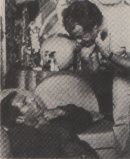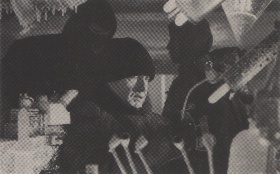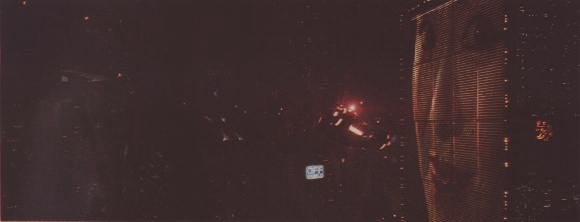BRmovie.com: Blade Runner Souvenir Magazine - Official Collector's Edition

 The
BLADE RUNNER script was a great screenplay and, oddly enough, a similar
thing happened with ALIEN. When ALIEN came in out of the blue, I thought
it was a wonderful script and I keyed in what I thought could be done
with it - I saw it totally. Michael Deeley brought BLADE RUNNER to me
when I was finishing ALIEN. At the time I was reading the screenplay,
I thought it was very interesting, but thought, "Oh, science fiction
again." Then, while I was preparing something else, (the
"something else" was 'Dune'), the BLADE RUNNER screenplay
stayed in my mind. I kept thinking it wasn't really science fiction at
all. In a funny kind of way, it was a rather contemporary movie. So I
went back to Michael and said, "Let's do it."
The
BLADE RUNNER script was a great screenplay and, oddly enough, a similar
thing happened with ALIEN. When ALIEN came in out of the blue, I thought
it was a wonderful script and I keyed in what I thought could be done
with it - I saw it totally. Michael Deeley brought BLADE RUNNER to me
when I was finishing ALIEN. At the time I was reading the screenplay,
I thought it was very interesting, but thought, "Oh, science fiction
again." Then, while I was preparing something else, (the
"something else" was 'Dune'), the BLADE RUNNER screenplay
stayed in my mind. I kept thinking it wasn't really science fiction at
all. In a funny kind of way, it was a rather contemporary movie. So I
went back to Michael and said, "Let's do it."
Going through cities like Chicago and New York on a bad winter afternoon, you get a sense of the city on overload. And even going through the modern sectors that have just been put up, there's rubbish and there are bigger and bigger buildings going up. Essentially the city is becoming more and more dwarfed by the environment.
Fashions aren't going to be changing that drastically in forty years. I think that's always a disastrous mistake that filmmakers fall into - the diagonal zippers and silver hair syndrome. When you do a futuristic story, unless you're going to leap forward 100, 200, 300 years, you're not going to see that drastic a change. Certainly not in forty years.
When we set out to do this film, we decided to make "android" a taboo word. I said anybody who uses the word "android" gets their head broken with a baseball bat. The word sets up all sorts of preconceptions of the kind of film this could be. An android might be human, actually be flesh and blood, genetically structured, but we simply decided not to use the word because its over-used and misused. So we developed our own word, which is the word "replicant."
Top: Director Ridley Scott demonstrates a choke hold to Harrison Ford for an upcoming scene.
A replicant is essentially a total human being, an all-flesh culture, that is very advanced and highly perfected. That's the odd dichotomy of the whole story. the detective's job is to be a kind of policeman but also an exterminator, if necessary. His job is to hunt replicants who happen to find their way into the city. They have no right to be there because the replicants were originally developed for Off-World situations, military, industrial, mining. they are kind of a second-class generation developed for inhospitable environments and dangerous or boring work. There may come a time when, if we're sending an astronaut off into deep space and know he'll never come back, we may want to send a replicant instead.

Before the film, I spent a little bit of time with the actors finding a level and dimension on the characters. After a fair amount of discussion, the actor starts to key in on what he feels would be right for himself with what I want, and starts forming it himself along that route. It's almost like a sculpting process. You gradually build up the character as you go. I also find it useful to write out a biography of each character - it helps give the actor a direction.
I spent time explaining to Rutger and Brion how the replicants were originally designed and what duties they would have performed. almost like giving them a potted history of how science had developed up to this particular point and what uses had been found for what had essentially become a second-class generation. They started to key in on that and argue about it. As soon as you get an actor arguing about something, then you know you're getting somewhere.
I think a lot of directors are suddenly realizing that special effects films don't necessarily mean crappy movies. The words "special effects" are frequently associated with lousy horror movies. But now I think good effects movies are attracting a different level of director. Directors and producers are beginning to realize that the special effects are simply tools to make a good film, a very necessary part. Unless the director gets involved in them, he's gambling. The director has got to have input or he'll get the wrong effects.

Above: Ridley Scott (wearing cap) and crew brave the below-zero temperatures in Chew's laboratory, which was actually the interior of a freezer at a meat packing plant in Downey, California.
Below: On the way to the police headquarters, Gaff's spinner passes this gigantic billboard, which appears 3-dimensional. The advertisement had to be separately photographed and projected onto its futuristic billboard. Scott's theory of advertising in the future called for a media blitz including video outdoor billboards.
|
PREV <<< |
Index OFC 02 03 04 05 06 07 08 09 10 11 12 13 14 15 16 17 18 19 20 21 22 23 24 25 26 27 28 29 30 31 32 33 CPS 36 37 38 39 40 41 42 43 44 45 46 47 48 49 50 51 52 53 54 55 56 57 58 59 60 61 62 63 64 65 66 67 OBC |
NEXT >>> |